Introducing “Trail Talk”
These interview podcast posts are a new addition to Cole’s Climb, where I share stories from other members of the outdoor community. Topics will range from wild adventures, to survival skills, conservation, and current events.
Soon they’ll be available on all major podcasting platforms.
For now: look for them in your mailbox on Sundays at 9 a.m., MST. The stories you’re used to seeing will still arrive at the usual time, Thursday mornings.
EP 01: Cheryl Spencer, Ranger at Katmai National Park and Preserve
To start the series, we’re headed all the way up to Alaska for the start of Fat Bear Week.
Fall is upon us. The Salmon are swimming. And the bears are hungry.
Subscriptions are free, support independent writing, and ensure you never miss an edition.
Bears across North America are preparing to bed down for their 6-7 month hibernation. If they’re to endure into the spring, they need to consume a truly massive amount of calories each day. It truly is the survival of the fattest.
Fat Bear Basics
If you needed to eat 90 pounds of food per day to survive, you’d probably spend quite a bit of time hanging around your favorite restaurant, which is pretty much what the bears living in Katmai National Park and Preserve do, over at Brooks Falls.
For a few years now, rangers at Katmai have been putting together tournament brackets of the fattest bears at the falls. The public votes on which bear they think deserves to advance, and a winner is crowned.
If you’d like to cast your ballot, you can do so at this link. Voting occurs daily to determine which bear advances. Last year, more than 600,000 people participated.
You can learn more about each contender over on explore.org; they have a nifty meet-the-bears guide to provide a glimpse at their lives, strengths, and struggles.
Interview Notes
4:30 — Momma bear has mouths to feed
9:00 — A great year for fishing
10:40 — Bears Vs. Humans
14:00 — Life as a ranger at Katmai
16:30 — Romance brewing between competitors
19:10 — Being good bear neighbors
20:30 — Why food is banned in the park
22:00 — Keeping bears wild
24:00 — Giving back (links below!)
Know someone who loves fat bear week? Send this post their way!
“We Need to Control our Human Behavior, and not put the Expectation on Bears.”
This all may sound a bit ridiculous. But aside from providing a bit of good fun, the bigger point is bringing awareness to this critical part of the bear lifecycle, how we impact it, and how we can be good neighbors in the spaces we share with these animals.
This largely depends on whether you’re visiting in their home — out on a hike, or camping trip — or if their home happens to border yours. Colorado Parks & Wildlife has some helpful tips. But here’s a rundown of the more basic ones.
On the Trail
Bears have a natural fear of humans — at least, they should, provided no one has been giving them easy access to human food. Most of the time, that means the bears will do all the work for you, and keep away.
When you’re out in the wild:
Ensure you’re not leaving food around designated camping areas.
Secure your food and scent-carrying items in a bear bag or cannister
Do not bring food or food-smelling items into your tent
Scare away bears that enter designated campsites, then alert park officials
Back away slowly if you encounter a bear on the trail. Make yourself look big or tall if they approach
Beware bear cubs; an extremely protective mother bear is usually close
Carry bear spray as a precaution
At Home
If you live somewhere remote, or in a neighborhood bordering a bear habitat, the rules are a bit different. We adopt a more “live and let live” policy in the woods.
Remember: bears are trying to eat as much as possible, on a tight schedule. They’re looking for easy sources of food. If they can find easy sources of nutrition near your home, they’ll keep coming back. Likewise, if they get nothing: they will move on.
Secure your trash cans
Remove bird feeders — bears will eat the seed
Haze any bears that you catch hanging around your home. Do this safely, from a window. Don’t go out and confront the bear
Report bears that have lost their natural fear of humans. They may need to be captured and relocated
By keeping bears wild, we can also help reduce conflicts that end poorly for both humans, and the bears themselves.
Fat Bear Links
What I’m Reading
I’ve recently encountered “That’s Philosophical,” an inspirational newsletter that covers psychology, mindfulness, and self-improvement.
A recent post called "Outwork Their Luck" spoke to me in particular. It offers fantastic perspective for anyone who feels they’re working hard without much to show for it quite yet.
Definitely worth a read to quiet the troubled mind.
I Want to Hear from You
Have you ever had a wild animal encounter out on the trail? How did you handle it? Do you have any tricks to share with fellow hikers?
Most importantly: which bear are you pulling for to win it all!?

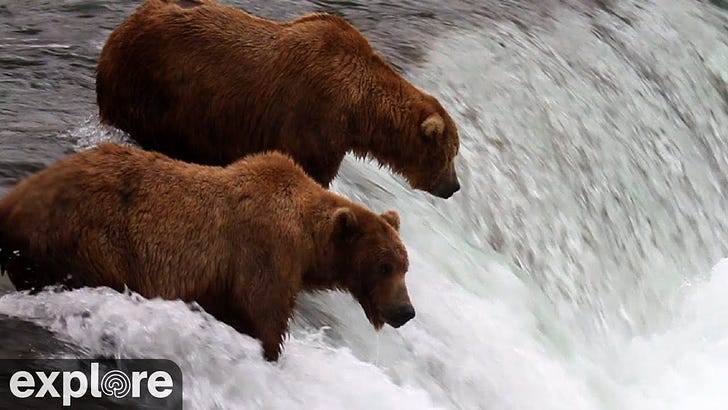






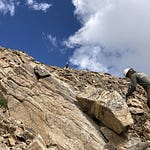
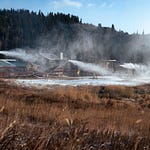

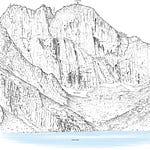


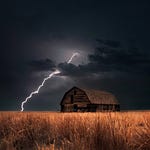
Fat Bear Week is Here, With Katmai Park Ranger Cheryl Spencer